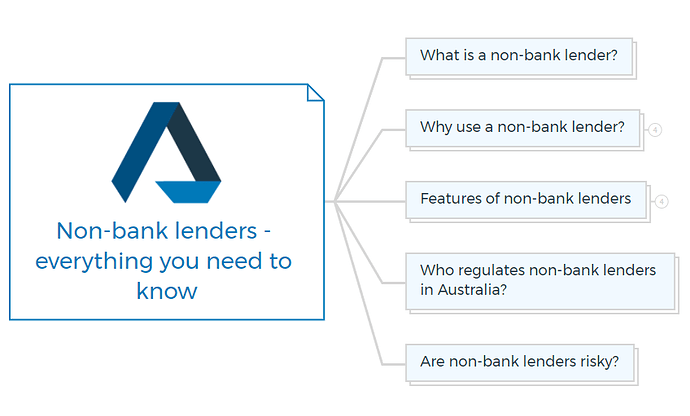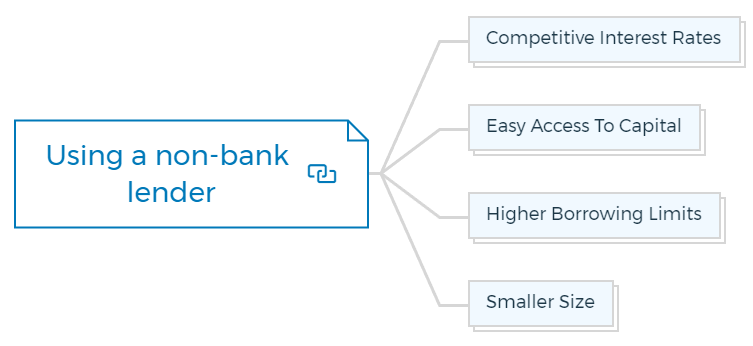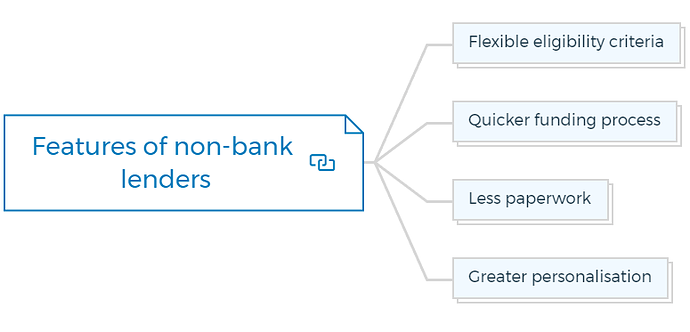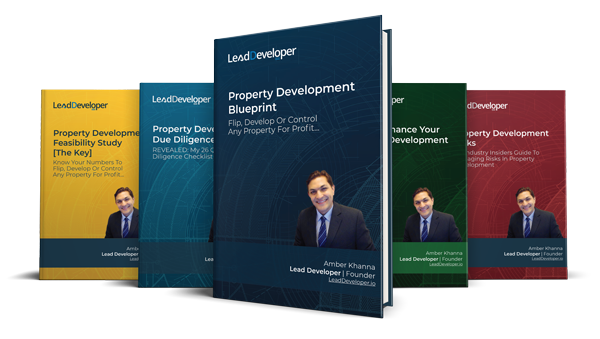Everything you need to know about non-bank lenders.
Competition in Australia’s mortgage market is heating up due to the rise of non-bank lenders. Borrowers are becoming more interested in non-bank mortgage lenders as they offer innovative and flexible home loan products.
Scroll down and learn more about non-bank lenders and how they work.
You are missing out if you haven’t yet subscribed to our YouTube channel.
What is a non-bank lender?
Non-bank lenders are financial institutions that provide various personal or business financing services. Non-banks do not take deposits and receive funding from asset finance, private investors, venture capital and institutional investors.
Non-banks are more flexible than traditional banks regarding loan terms, making them attractive to people looking for better lending options. They are custom-made loan products according to the situation of an individual borrower.
Non-bank lenders can be building societies, mortgage managers, or credit unions.
Why use a non-bank lender?
There are several benefits and reasons to use non-bank lenders. It includes -
Competitive Interest Rates
Non-bank lenders often offer competitive interest rates, which are more attractive than traditional banking institutions.
This is especially true for those with lower credit scores and limited financial history, as non-bank lenders tend to be more flexible when assessing loan applications.
Easy Access To Capital
Depending on the loan type and application, you can receive funds in as little as 48 hours. This is particularly helpful if you want to purchase a home or car quickly.
Higher Borrowing Limits
Non-bank lenders provide larger sums of money than traditional banks, allowing you to access larger loans when needed.
Smaller Size
Compared to banks and other financial institutions, non-bank lenders are smaller and have different regulations. Being smaller in size, these lenders have improved customer service.
Non-banks are better positioned to offer personalised service and quick turnaround times on loan applications for the individual borrower.
Learn More
Features of non-bank lenders
Flexible eligibility criteria
Non-bank lenders have more relaxed eligibility requirements than other financial organisations. It includes minimum income, credit score and other financial details.
Quicker funding process
You can get the capital the same day or the next day of funding for approved applications. It is much faster than going through a traditional bank loan.
Less paperwork
Non-bank lenders usually require less documentation than traditional banks, meaning the application process is much simpler and quicker.
Greater personalisation
They offer more customised products tailored to your specific needs, giving you access to financing options.
Property Development Books - “Starter-Pack”
18 Property Development Books To Get You Started Now
Includes 18 x detailed eBooks
✓ Property Development Checklist - 6 Pages
✓ How To Finance Your Property Development Project? - 13 Pages
✓ Property Development Team - 19 Pages
✓ Site Acquisition Process - 14 Pages
✓ The Ultimate Guide To Getting Started In Property Development - 42 Pages
✓ My Secret Property Development Process - 28 Pages
✓ How To Nail Your Next No Money Down Deal? - 29 Pages
✓ Industry Insiders Guide To Managing Risks In Property Development - 26 Pages
✓ How To Become A Property Developer? - 41 Pages
✓ Do You Have What It Takes To Be A Property Developer? - 12 Pages
✓ 7 Common Mistakes Made By Property Developers & How To Avoid Them? - 12 Pages
✓ 5 Reasons, Buy & Hold Property Investors Fail At Property Development - 16 Pages
✓ 10 Financial Mistakes Made By Property Investors & Developers - 54 Pages
✓ My 26 Question Due Diligence Checklist - 21 Pages
✓ Property Development 101: The Feasibility Study - 34 Pages
✓ Property Development 101: Construction Guide - 55 Pages
✓ Property Development Blueprint - 66 Pages
✓ Your Definitive Guide To Property Options - 36 Pages
Who regulates non-bank lenders in Australia?
Non-bank lenders, non-bank financial institutions (NBFIs), or non-bank financial companies (NBFCs) are all the same and do not have a banking license. This prevents federal and state financial regulators from monitoring them.
Non-bank lenders in Australia are regulated by the Australian Securities and Investments Commission (ASIC).
ASIC ensures that all non-bank lenders comply with the National Consumer Credit Protection Act 2009 (NCCP). This act sets out rules about how lenders must advertise, assess applications for credit and manage customer complaints.
Are non-bank lenders risky?
As the Australian Securities and Investment Commission governs non-bank lenders, they still follow the National Consumer Credit Protection Act guidelines.
The NCCP Act guarantees consumer protection and the upholding of moral and professional standards in the finance sector.
Also, Australian consumer law, privacy law, and the ePayments code apply to non-bank lenders. All this shows that non-bank lenders are as safe as traditional banks.
Non-Bank Lenders Vs Banks
Non-Bank Lenders
- Higher application fees
- Higher interest rate to compensate for higher project risk
- Require little or no pre-sales
- Less borrowing scrutiny
- Can offer a higher LVR (Loan to Value Ratio)
Banks
- Lower application fees
- Lower interest rate
- Will almost always require pre-sales enough to cover 100% of the debt
- Borrower scrutiny
- Lower LVR (Loan to Value ratio)
Property Finance Made Easy
We specialise in Development funding | Commercial finance | Construction loans | Portfolio refinancing & Property investment loans in Australia.
Click Here to strategise with Amber







